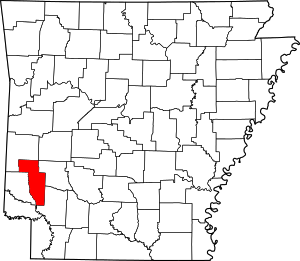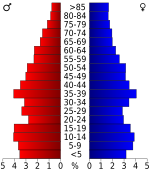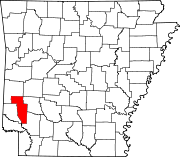Howard County, Arkansas
Howard County | |
|---|---|
 | |
 Location within the U.S. state of Arkansas | |
 Arkansas's location within the U.S. | |
| Coordinates: 34°08′10″N 93°59′14″W / 34.136111111111°N 93.987222222222°W | |
| Country | |
| State | |
| Founded | April 17, 1873 |
| Seat | Nashville |
| Largest city | Nashville |
| Area | |
• Total | 595 sq mi (1,540 km2) |
| • Land | 589 sq mi (1,530 km2) |
| • Water | 6.8 sq mi (18 km2) 1.1% |
| Population (2020) | |
• Total | 12,785 |
| • Density | 21/sq mi (8.3/km2) |
| Time zone | UTC−6 (Central) |
| • Summer (DST) | UTC−5 (CDT) |
| Congressional district | 4th |
Howard County is a county located in the U.S. state of Arkansas. As of the 2020 census, the population was 12,785.[1] The county seat is Nashville.[2] Howard County is Arkansas's 74th county, formed on April 17, 1873, and named for James Howard,[3] a state senator. It is a dry county.
Geography
According to the U.S. Census Bureau, the county has a total area of 595 square miles (1,540 km2), of which 589 square miles (1,530 km2) is land and 6.8 square miles (18 km2) (1.1%) is water.[4]
Major highways
Adjacent counties
- Polk County (north)
- Montgomery County (northeast)
- Pike County (east)
- Hempstead County (southeast)
- Little River County (southwest)
- Sevier County (west)
National protected area
- Ouachita National Forest (part)
Demographics
| Census | Pop. | Note | %± |
|---|---|---|---|
| 1880 | 9,917 | — | |
| 1890 | 13,789 | 39.0% | |
| 1900 | 14,076 | 2.1% | |
| 1910 | 16,898 | 20.0% | |
| 1920 | 18,565 | 9.9% | |
| 1930 | 17,489 | −5.8% | |
| 1940 | 16,621 | −5.0% | |
| 1950 | 13,342 | −19.7% | |
| 1960 | 10,878 | −18.5% | |
| 1970 | 11,412 | 4.9% | |
| 1980 | 13,459 | 17.9% | |
| 1990 | 13,569 | 0.8% | |
| 2000 | 14,300 | 5.4% | |
| 2010 | 13,789 | −3.6% | |
| 2020 | 12,785 | −7.3% | |
| 2023 (est.) | 12,533 | [5] | −2.0% |
| U.S. Decennial Census[6] 1790–1960[7] 1900–1990[8] 1990–2000[9] 2010[10] | |||

2020 census
| Race | Number | Percentage |
|---|---|---|
| White (non-Hispanic) | 7,982 | 62.43% |
| Black or African American (non-Hispanic) | 2,626 | 20.54% |
| Native American | 82 | 0.64% |
| Asian | 62 | 0.48% |
| Pacific Islander | 4 | 0.03% |
| Other/Mixed | 512 | 4.0% |
| Hispanic or Latino | 1,517 | 11.87% |
As of the 2020 United States census, there were 12,785 people, 5,142 households, and 3,503 families residing in the county.
2000 census
As of the 2000 census,[13] there were 14,300 people, 5,471 households, and 3,922 families residing in the county. The population density was 24 people per square mile (9.3 people/km2). There were 6,297 housing units at an average density of 11 units per square mile (4.2 units/km2). The racial makeup of the county was 73.60% White, 21.86% Black or African American, 0.41% Native American, 0.50% Asian, 0.01% Pacific Islander, 2.76% from other races, and 0.86% from two or more races. 5.08% of the population were Hispanic or Latino of any race. 4.75% reported speaking Spanish at home, while 1.73% speak German.[14]
There were 5,471 households, out of which 34.10% had children under the age of 18 living with them, 55.20% were married couples living together, 12.70% had a female householder with no husband present, and 28.30% were non-families. 25.70% of all households were made up of individuals, and 12.60% had someone living alone who was 65 years of age or older. The average household size was 2.55 and the average family size was 3.04.
In the county, the population was spread out, with 26.90% under the age of 18, 8.60% from 18 to 24, 27.80% from 25 to 44, 21.60% from 45 to 64, and 15.10% who were 65 years of age or older. The median age was 36 years. For every 100 females there were 95.10 males. For every 100 females age 18 and over, there were 91.20 males.
The median income for a household in the county was $28,699, and the median income for a family was $34,510. Males had a median income of $28,086 versus $17,266 for females. The per capita income for the county was $15,586. About 11.90% of families and 15.50% of the population were below the poverty line, including 20.10% of those under age 18 and 17.00% of those age 65 or over.
Government
Over the past few election cycles, Howard County has trended heavily towards the GOP. The last Democratic presidential candidate (as of 2024) to carry this county was Bill Clinton in 1996.
| Year | Republican | Democratic | Third party(ies) | |||
|---|---|---|---|---|---|---|
| No. | % | No. | % | No. | % | |
| 2024 | 3,246 | 72.57% | 1,158 | 25.89% | 69 | 1.54% |
| 2020 | 3,367 | 69.65% | 1,340 | 27.72% | 127 | 2.63% |
| 2016 | 3,157 | 67.54% | 1,351 | 28.90% | 166 | 3.55% |
| 2012 | 2,892 | 64.81% | 1,471 | 32.97% | 99 | 2.22% |
| 2008 | 2,957 | 61.02% | 1,746 | 36.03% | 143 | 2.95% |
| 2004 | 2,736 | 55.35% | 2,166 | 43.82% | 41 | 0.83% |
| 2000 | 2,326 | 52.16% | 2,063 | 46.27% | 70 | 1.57% |
| 1996 | 1,478 | 31.91% | 2,741 | 59.18% | 413 | 8.92% |
| 1992 | 1,728 | 34.73% | 2,764 | 55.56% | 483 | 9.71% |
| 1988 | 2,510 | 57.87% | 1,818 | 41.92% | 9 | 0.21% |
| 1984 | 3,079 | 63.72% | 1,746 | 36.13% | 7 | 0.14% |
| 1980 | 2,386 | 47.12% | 2,564 | 50.63% | 114 | 2.25% |
| 1976 | 1,575 | 32.94% | 3,207 | 67.06% | 0 | 0.00% |
| 1972 | 2,682 | 71.50% | 1,069 | 28.50% | 0 | 0.00% |
| 1968 | 1,286 | 32.09% | 1,061 | 26.48% | 1,660 | 41.43% |
| 1964 | 1,649 | 53.84% | 1,320 | 43.10% | 94 | 3.07% |
| 1960 | 1,225 | 44.79% | 1,366 | 49.95% | 144 | 5.27% |
| 1956 | 1,329 | 47.72% | 1,428 | 51.27% | 28 | 1.01% |
| 1952 | 944 | 38.64% | 1,492 | 61.07% | 7 | 0.29% |
| 1948 | 199 | 12.05% | 1,250 | 75.67% | 203 | 12.29% |
| 1944 | 576 | 27.20% | 1,538 | 72.62% | 4 | 0.19% |
| 1940 | 419 | 21.24% | 1,540 | 78.05% | 14 | 0.71% |
| 1936 | 275 | 16.02% | 1,437 | 83.69% | 5 | 0.29% |
| 1932 | 165 | 8.82% | 1,703 | 91.02% | 3 | 0.16% |
| 1928 | 763 | 41.76% | 1,055 | 57.74% | 9 | 0.49% |
| 1924 | 338 | 23.12% | 954 | 65.25% | 170 | 11.63% |
| 1920 | 1,208 | 44.94% | 1,452 | 54.02% | 28 | 1.04% |
| 1916 | 545 | 29.27% | 1,317 | 70.73% | 0 | 0.00% |
| 1912 | 321 | 24.06% | 760 | 56.97% | 253 | 18.97% |
| 1908 | 610 | 35.24% | 967 | 55.86% | 154 | 8.90% |
| 1904 | 500 | 39.03% | 644 | 50.27% | 137 | 10.69% |
| 1900 | 585 | 36.22% | 986 | 61.05% | 44 | 2.72% |
| 1896 | 294 | 17.41% | 1,392 | 82.42% | 3 | 0.18% |
Communities
Cities
- Dierks
- Mineral Springs
- Nashville (county seat)
Towns
Census-designated places
Other unincorporated communities
Historic communities
- Allbrook
- Antimony
- Baker Springs
- Carl
- Cowling
- Dial
- Eldridge
- Euclid
- Galena
- Henry
- Howe
- Markham
- Martha
- Minnie
- New Moon
- Pates
- Picayune
- Rosadale
Townships
Townships in Arkansas are the divisions of a county. Each township includes unincorporated areas; some may have incorporated cities or towns within part of their boundaries. Arkansas townships have limited purposes in modern times. However, the United States census does list Arkansas population based on townships (sometimes referred to as "county subdivisions" or "minor civil divisions"). Townships are also of value for historical purposes in terms of genealogical research. Each town or city is within one or more townships in an Arkansas county based on census maps and publications. The townships of Howard County are listed below; listed in parentheses are the cities, towns, and/or census-designated places that are fully or partially inside the township. [16][17]
- Blackland
- Blue Bayou
- Blue Ridge
- Brewer
- Buck Range
- Burg
- Center Point
- Clay
- County Line
- Dillard
- Duckett
- Franklin
- Holly Creek
- Madison (Dierks)
- Mineral Springs (Mineral Springs)
- Mountain
- Muddy Fork
- Nashville (Nashville)
- Saline
- Saratoga
- Tollette (Tollette) --- township completely inside Blackland Township
- Umpire
See also
- List of lakes in Howard County, Arkansas
- National Register of Historic Places listings in Howard County, Arkansas
References
- ^ "Census - Geography Profile: Howard County, Arkansas". United States Census Bureau. Retrieved January 20, 2023.
- ^ "Find a County". National Association of Counties. Archived from the original on May 31, 2011. Retrieved June 7, 2011.
- ^ Gannett, Henry (1905). The Origin of Certain Place Names in the United States. Govt. Print. Off. pp. 162.
- ^ "2010 Census Gazetteer Files". United States Census Bureau. August 22, 2012. Retrieved August 26, 2015.
- ^ "Annual Estimates of the Resident Population for Counties: April 1, 2020 to July 1, 2023". United States Census Bureau. Retrieved March 30, 2024.
- ^ "U.S. Decennial Census". United States Census Bureau. Retrieved August 26, 2015.
- ^ "Historical Census Browser". University of Virginia Library. Retrieved August 26, 2015.
- ^ Forstall, Richard L., ed. (March 27, 1995). "Population of Counties by Decennial Census: 1900 to 1990". United States Census Bureau. Retrieved August 26, 2015.
- ^ "Census 2000 PHC-T-4. Ranking Tables for Counties: 1990 and 2000" (PDF). United States Census Bureau. April 2, 2001. Archived (PDF) from the original on March 27, 2010. Retrieved August 26, 2015.
- ^ "State & County QuickFacts". United States Census Bureau. Archived from the original on June 7, 2011. Retrieved May 21, 2014.
- ^ Based on 2000 census data
- ^ "Explore Census Data". data.census.gov. Retrieved December 30, 2021.
- ^ "U.S. Census website". United States Census Bureau. Retrieved May 14, 2011.
- ^ "Language Map Data Center". www.mla.org. Retrieved August 28, 2018.
- ^ "Dave Leip's Atlas of U.S. Presidential Elections". Retrieved November 18, 2016.
- ^ 2011 Boundary and Annexation Survey (BAS): Howard County, AR (PDF) (Map). U. S. Census Bureau. Archived from the original (PDF) on October 19, 2012. Retrieved August 23, 2011.
- ^ "Arkansas: 2010 Census Block Maps - County Subdivision". United States Census Bureau. Retrieved May 29, 2014.

